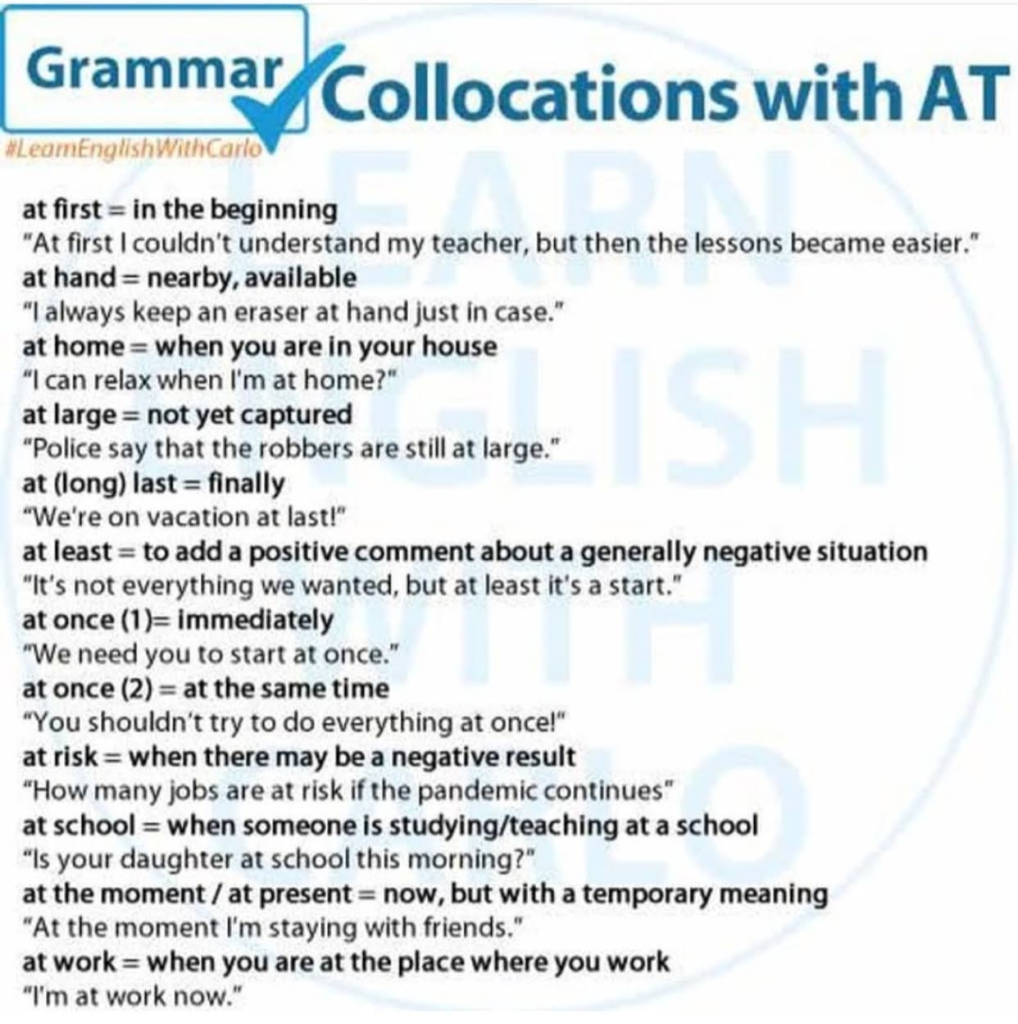The preposition “at” is used in many common expressions in English, each with unique meanings. Below, you’ll find clear explanations and examples to help you understand and use these expressions confidently. Let’s explore!

1. At First = In the beginning
This expression describes the initial phase of something, often followed by a change.
Examples:
- At first, I couldn’t understand my teacher, but then the lessons became easier.
- At first, she didn’t like her new job, but now she loves it.
- At first, we thought the movie was boring, but it got exciting halfway through.
2. At Hand = Nearby or available
This phrase refers to something that is close by and ready to use.
Examples:
- I always keep an eraser at hand just in case.
- Make sure you have all the documents at hand before the meeting.
- With my phone at hand, I never miss an important call.
3. At Home = When you are in your house
This phrase refers to the comfort or state of being in your own living space.
Examples:
- I can relax when I’m at home.
- Is your brother at home, or has he gone out?
- At home, we usually eat dinner together as a family.
4. At Large = Not yet captured
This expression is often used in reports about someone, usually a criminal, who hasn’t been caught.
Examples:
- Police say that the robbers are still at large.
- The escaped prisoner is still at large and considered dangerous.
- Several suspects remain at large following the bank robbery.
5. At (Long) Last = Finally
Use this expression to express relief or happiness when something you’ve been waiting for happens.
Examples:
- We’re on vacation at last!
- At last, the construction of the new library is complete.
- After years of hard work, she achieved her dream at long last.
6. At Least = To add a positive comment about a generally negative situation
This phrase highlights a small benefit in an otherwise disappointing scenario.
Examples:
- It’s not everything we wanted, but at least it’s a start.
- The weather isn’t great, but at least it’s not raining.
- We didn’t win the game, but at least we tried our best.
7. At Once (1) = Immediately
This version is used to demand or describe immediate action.
Examples:
- We need you to start at once.
- Call an ambulance at once—this is an emergency!
- The manager asked them to fix the issue at once.
8. At Once (2) = At the same time
This version describes multiple actions or events happening simultaneously.
Examples:
- You shouldn’t try to do everything at once!
- It’s hard to focus when too many people are talking at once.
- The children started shouting and laughing at once.
9. At Risk = When there may be a negative result
This expression describes situations where danger, harm, or loss is possible.
Examples:
- How many jobs are at risk if the pandemic continues?
- The company’s reputation is at risk after the scandal.
- Without proper safety measures, workers are at risk of injury.
10. At School = When someone is studying or teaching at a school
This phrase refers to being physically present at an educational institution.
Examples:
- Is your daughter at school this morning?
- The kids are at school until 3 p.m.
- At school, we learned about different cultures and traditions.
11. At the Moment / At Present = Now, but with a temporary meaning
These phrases are used to describe a current situation that is likely to change.
Examples:
- At the moment, I’m staying with friends.
- We’re not hiring at present, but check back next month.
- At the moment, they’re renovating their house, so it’s a bit chaotic.
12. At Work = When you are at the place where you work
This phrase indicates that someone is physically present at their job or workplace.
Examples:
- I’m at work now.
- She’s always very busy when she’s at work.
- At work, we’re preparing for a big presentation next week.
Final Thoughts
Expressions with “at” are incredibly versatile and useful in everyday English. By practicing these phrases in context, you’ll not only expand your vocabulary but also sound more fluent and natural.
Which of these expressions do you find the most challenging or useful? Share your thoughts and examples in the comments below!
